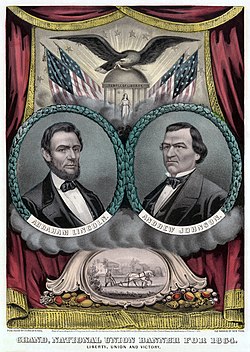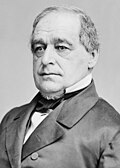The party supported a Platform of 11 resolutions. Several resolutions were notable as they specified that the cause of the Civil War was slavery, called for slavery's eradication from the union, called for the complete destruction of the Confederacy, opened military enlistment to freed slaves, adopted the Emancipation Proclamation, and supported an increase in foreign immigration and asylum as just policy. [1] [3] Dennis Francis Murphy, member of the Official Corps of Reporters for the U.S. Senate, transcribed the unveiling of, and response to, the resolutions: [1] [4]
1. Resolved, That it is the highest duty of every American citizen to maintain against all their enemies the integrity of the Union and the paramount authority of the Constitution and laws of the United States; and that, laying aside all differences of political opinion, we pledge ourselves, as Union men, animated by a common sentiment and aiming at a common object, to do everything in our power to aid the Government in quelling by force of arms the Rebellion now raging against its authority, and in bringing to the punishment due to their crimes the Rebels and traitors arrayed against it.
2. Resolved, That we approve the determination of the Government of the United States not to compromise with Rebels, or to offer them any terms of peace, except such as may be based upon an unconditional surrender of their hostility and a return to their just allegiance to the Constitution and laws of the United States, and that we call upon the Government to maintain this position, and to prosecute the war with the utmost possible vigor to the complete suppression of the Rebellion, in full reliance upon the self-sacrificing patriotism, the heroic valor and the undying devotion of the American people to their country and its free institutions.
3. Resolved, That as Slavery was the cause, and now constitutes the strength, of this Rebellion, and as it must be, always and everywhere, hostile to the principles of Republican Government, justice and the National safety demand its utter and complete extirpation from the soil of the Republic : — and that, while we uphold and maintain the acts and proclamations by which the Government, in its own defence, has aimed a death-blow at this gigantic evil, we are in favor, furthermore, of such an amendment to the Constitution, to be made by the people in conformity with its provisions, as shall terminate and forever prohibit the existence of Slavery within the limits or the jurisdiction of the United States.
4. Resolved, That the thanks of the American people are due to the soldiers and sailors of the Army and Navy, who have periled their lives in defence of their country and in vindication of the honor of its flag; that the nation owes to them some permanent recognition of their patriotism and their valor, and ample and permanent provision for those of their survivors who have received disabling and honorable wounds in the service of the country; and that the memories of those who have fallen in its defence shall be held in grateful and everlasting remembrance.
5. Resolved, That we approve and applaud the practical wisdom, the unselfish patriotism and the unswerving fidelity to the Constitution and the principles of American liberty, with which Abraham Lincoln has discharged, under circumstances of unparalleled difficulty, the great duties and responsibilities of the Presidential office; that we approve and endorse, as demanded by the emergency and essential to the preservation of the nation and as within the provisions of the Constitution, the measures and acts which he has adopted to defend the nation against its open and secret foes: that we approve, especially, the Proclamation of Emancipation, and the employment as Union soldiers of men heretofore held in slavery ; and that we have full confidence in his determination to carry these and all other Constitutional measures, essential to the salvation of the country into full and complete effect.
6. Resolved, That we deem it essential to the general welfare that harmony should prevail in the National Councils, and we regard as worthy of public confidence and official trust those only who cordially endorse the principles proclaimed in these resolutions, and which should characterize the administration of the Government.
7. Resolved, That the Government owes to all men employed in its armies, without regard to distinction of color, the full protection of the laws of war — and that any violation of these laws, or of the usages of civilized nations in time of war, by the Rebels now in arms, should be made the subject of prompt and full redress.
8. Resolved, That foreign immigration, which in the past has added so much to the wealth, development of resources and increase of power to this nation, the asylum of the oppressed of all nations, should be fostered and encouraged by a liberal and just policy.
9. Resolved. That we are in favor of the speedy construction of the Railroad to the Pacific coast.
10. Resolved, That the National faith, pledged for the redemption of the public debt, must be kept inviolate, and that for this purpose we recommend economy and rigid responsibility in the public expenditures, and a vigorous and just system of taxation; and that it is the duty of every loyal State to sustain the credit and promote the use of the National currency.
11. Resolved, That we approve the position taken by the Government that the people of the United States can never regard with indifference the attempt of any European Power to overthrow by force or to supplant by fraud the institutions of any Republican Government on the Western Continent — and that they will view with extreme jealousy, as menacing to the peace and independence of their own country, the efforts of any such power to obtain new footholds for Monarchial Governments, sustained by foreign military force, in near proximity to the United States.


















